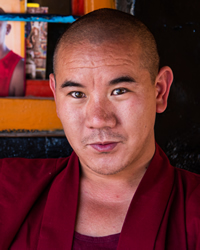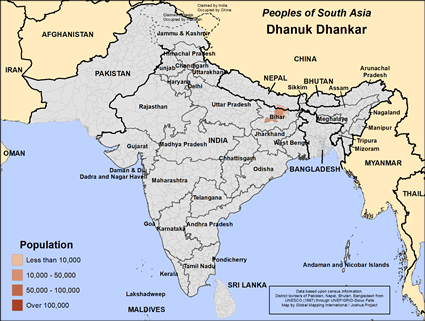Dhanuk Dhankar in Nepal

Photo Source:
Saurabh Chatterjee - Flickr
Creative Commons
|

Map Source:
People Group data: Omid. Map geography: UNESCO / GMI. Map Design: Joshua Project
|
| People Name: | Dhanuk Dhankar |
| Country: | Nepal |
| 10/40 Window: | Yes |
| Population: | 6,600 |
| World Population: | 81,600 |
| Primary Language: | Maithili |
| Primary Religion: | Hinduism |
| Christian Adherents: | 0.00 % |
| Evangelicals: | 0.00 % |
| Scripture: | New Testament |
| Ministry Resources: | Yes |
| Jesus Film: | Yes |
| Audio Recordings: | Yes |
| People Cluster: | South Asia Hindu - other |
| Affinity Bloc: | South Asian Peoples |
| Progress Level: |
|
Introduction / History
The Dhanuk name could have come from a number of ancient words. One of these is the word for grain, another means "archer" and a third word refers to a bow-like instrument for carding cotton. Each of these refers to a particular job they had. They might have been the caste that cleaned grain, one that cleaned cotton, or those who were bowmen. There are only theories about their origin. One anthropologist thought they were a caste that served higher castes, not only by the tasks referred to already, but also as farm workers, water gatherers, musicians, basket-makers or palanquin-bearers. All of these are tasks that belong to the low status caste. The Dhankar are one of the subgroups of the Dhanuk community.
What Are Their Lives Like?
Dhanuks do not marry within the clan nor do they practice cross-cousin marriage. In most of the cases, the parents seek a spouse for their offspring. They have a dowry system. They perform rites of birth, death and marriage. A pregnant Dhankar woman is kept in a separate home to arrange assistance from a midwife from the low status Chamar community. They make the baby cry as soon as he/she is born. The baby is given the milk of a goat to drink. Dhanuk homes are plastered with mud and built-in clusters in the river basins and edges of forests. In rural areas they have their own institutions to manage tribal reconciliation and settlement of disputes. Those who do not abide by rules are expelled from the ethnic group. Since they dwell in the river basins and the edges of forests, they fish and practice animal husbandry. Some Dhanuks are landowners, but many are absolutely landless. These landless ones earn their livelihood by working as agricultural laborers and household servants.
What Are Their Beliefs?
Dhankar Dhanuk in Nepal are Hindu only. Hinduism is a catch-all phrase for the local religions of South Asia. At the popular level, Hindus worship and serve the gods of the Hindu pantheon. They visit Hindu temples and offer prayers, food, flowers, and incense to their gods in hopes of gaining protection and benefits. They do not have a personal or familial relationship with their gods like Christians or Jews. They believe they drive out ghosts by putting the branches of jujube and unwanted shoes at the main gate of their homes.
What Are Their Needs?
Although the New Testament, Bible portions, audio, and the JESUS Film exist in the Maithiali language of this people group, they remain unreached with the gospel. Who will tell them?
Prayer Points
Pray that when Lord Jesus opens the way for Bible resources to reach and be presented to Dhankar Dhanuk people in Nepal. Pray they will respond and accept payment of the penalty for their sins already made by Jesus. Pray that true believers will move near these people and tell them the way to eternal life, making disciples who will make more disciples.